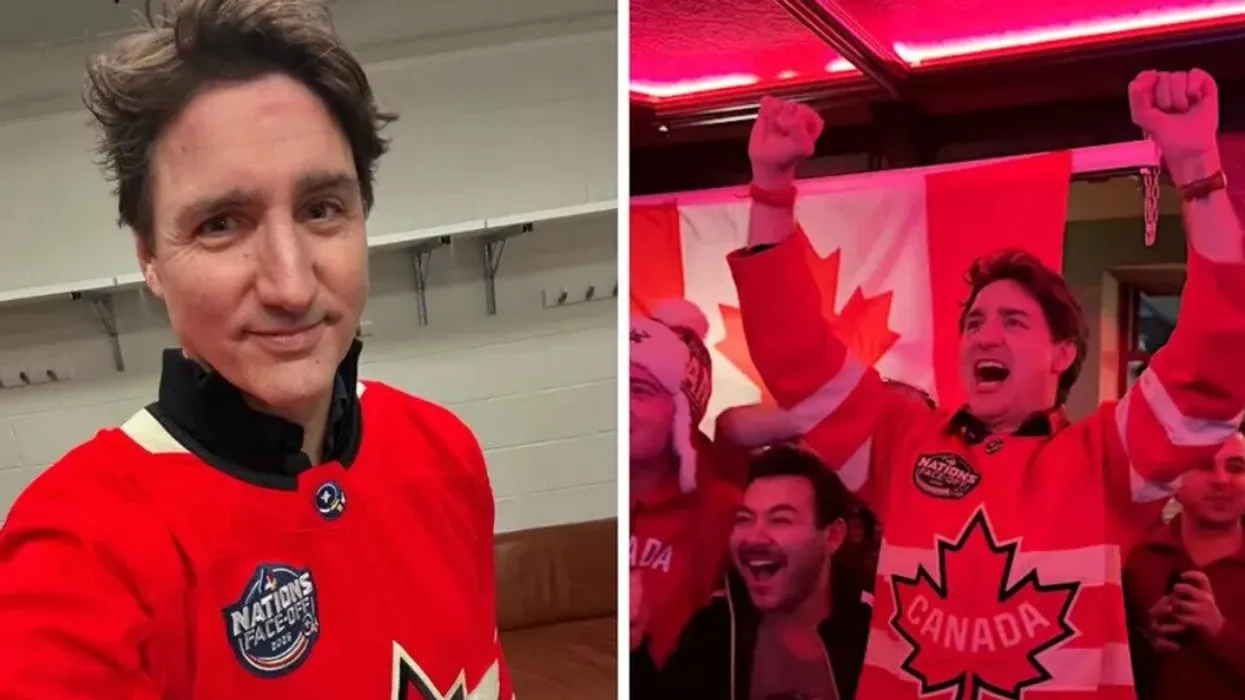Canadian Prime Minister Justin Trudeau added fuel to the fire with his bold pre-game statement on social media: “You can’t take our country, and you can’t take our game.” This comment, seemingly directed at former US President Donald Trump, underscored the underlying friction between the two nations.
The world of sports has always been intertwined with politics, and the latest chapter in the Canada-US rivalry took on an even deeper political significance at the 4 Nations Face-Off championship. Canada secured a dramatic 3-2 overtime victory against the United States, and the result ignited fresh tensions between the two neighboring countries.
The political and social undertones surrounding the game created an electric atmosphere, with fans on both sides expressing their patriotism in the most passionate ways possible. The highly anticipated clash in the 4 Nations Face-Off was more than just a hockey game; it was a reflection of the broader political climate between Canada and the US.
With the backdrop of Trump’s controversial remarks about annexing Canada and his recent tariffs announcement, emotions ran high in both countries, making the game an even more significant event beyond the rink.
The Political Undertones of a Classic Rivalry
The sporting rivalry between Canada and the US has always been intense, but this particular face-off carried a unique political charge. In the days leading up to the match, Trump had repeatedly made comments suggesting that Canada should become the 51st state of the United States. While some dismissed these remarks as mere rhetoric, many Canadians saw them as a direct challenge to their national identity.
Trump’s statement, made during a press conference at Mar-a-Lago, fueled further controversy: “You get rid of that artificially drawn line, and you take a look at what that looks like, and it would also be much better for national security.” His words, though provocative, were not surprising given his history of making bold statements regarding international relations.
Trudeau’s response was swift and firm. By invoking the sanctity of Canada’s national sport and national pride, he reinforced a sense of unity among Canadians.
“You can’t take our country, and you can’t take our game,” he posted on X. This statement resonated with many in Canada, serving as both a political retort and a rallying cry for Canadian fans. The comment also intensified the already fierce competition between the two hockey teams.
Read : Girl, You Are Not Governor of Canada Anymore: Elon Musk to Justin Trudeau
The tension between the political leaders trickled down to the players and fans, turning what would have been a normal hockey match into an emotionally charged battle.
You can’t take our country — and you can’t take our game.
— Justin Trudeau (@JustinTrudeau) February 21, 2025
Connor McDavid, Canada’s star player, took the moment in stride, stating after the game, “We knew this was about more than just hockey tonight. It was about pride, about proving something.” His game-winning overtime goal ensured that Canada not only won the championship but also sent a message of resilience and national unity.
Hockey as a Symbol of National Identity
Hockey is more than just a sport in Canada; it is an integral part of the nation’s identity. From childhood, Canadians grow up with the game, and their passion for it runs deep. So, when Trudeau made his now-viral statement, it touched upon something that went beyond politics—it was about heritage and pride.
The 4 Nations Face-Off had already been anticipated as a significant sporting event, but Trump’s annexation remarks gave the match a whole new layer of meaning. As the teams stepped onto the ice, it was evident that this game would not be played in isolation from the political discourse surrounding it.
The atmosphere inside the arena was electric. In Montreal, the US national anthem was met with loud boos from Canadian fans, an apparent response to Trump’s recent tariff announcements targeting Canadian goods.

This reaction was reminiscent of previous sporting events where political tensions had led to similar expressions of discontent. On the other hand, at TD Garden in Boston, Canadian fans countered any negativity by belting out a passionate rendition of “O Canada,” reaffirming their unwavering support for their team and country.
The game itself was a thrilling display of skill and determination. Canada and the US traded goals, each team refusing to back down. The match was physical, with three fights breaking out within the first nine seconds, setting the tone for an intense battle.
With the game tied 2-2, it was Connor McDavid who sealed the win for Canada in overtime, delivering a moment of triumph that will be remembered for years to come.
Beyond the ice, the political implications of the game were felt across Canada. Social media was flooded with reactions, with many Canadians expressing their pride in their country and their hockey team. The victory served as a moment of national solidarity, reminding everyone that while political leaders may clash, the spirit of the people remains strong.
The Broader Implications of the Canada-US Relationship
The rivalry between Canada and the US extends beyond sports. Historically, the two countries have had a complex relationship—one built on cooperation, yet often marred by political disagreements. From trade disputes to differing foreign policies, tensions have flared at various points in history. However, Trump’s repeated comments about annexation have struck a particularly sensitive chord among Canadians.
While many Americans might view Trump’s remarks as unserious, Canadians see them as an affront to their sovereignty. The idea that Canada could be absorbed into the United States is a notion that has long been dismissed by Canadians, yet Trump’s words reignited an old debate.
Trudeau’s strong response was not just about hockey; it was about asserting Canada’s independence and pushing back against what many in his country see as unwarranted rhetoric from their southern neighbor.

The post-game discussions extended far beyond sports analysts breaking down the match. Political commentators weighed in on how this incident could impact US-Canada relations in the future. Some experts noted that while Trump’s words may not have serious policy implications, they do shape public perception and fuel nationalist sentiments on both sides.
Despite the heated political climate, the sportsmanship displayed by the players remained commendable. After the game, many US players congratulated Team Canada on their victory, demonstrating that, at its core, hockey remains a unifying sport. However, for the fans and politicians, the game symbolized something far greater—a reaffirmation of national identity and pride.
As the dust settles from this politically charged championship, the broader question remains: how will Canada and the US navigate their relationship moving forward? While hockey might be just a game to some, for many Canadians, it is a representation of their cultural heritage and a point of pride that they are not willing to compromise.
Trudeau’s words, “You can’t take our country, and you can’t take our game,” encapsulate the emotions of a nation unwilling to be overshadowed. The victory in the 4 Nations Face-Off will be remembered not just as a thrilling overtime win, but as a moment when Canada stood tall—both on the ice and in the political arena.
let’s enjoy few years on earth with peace and happiness….✍🏼🙏

